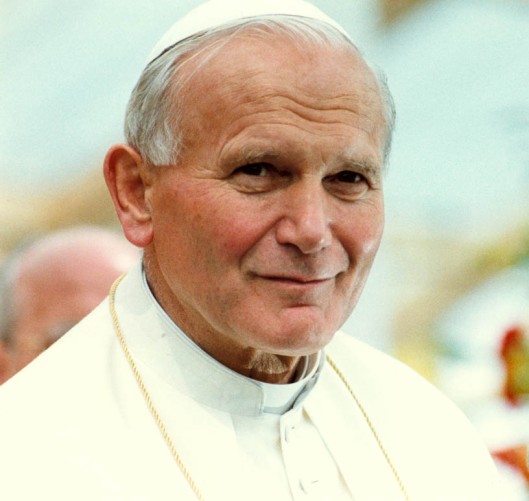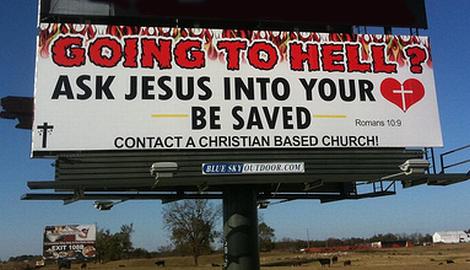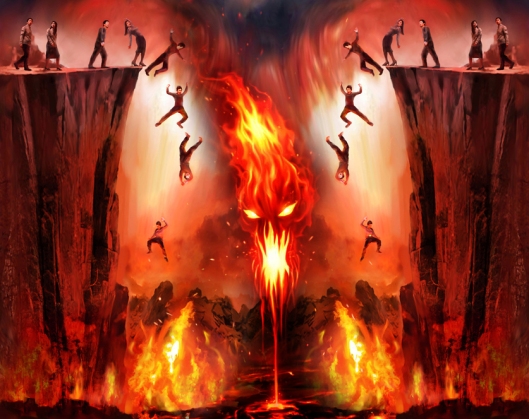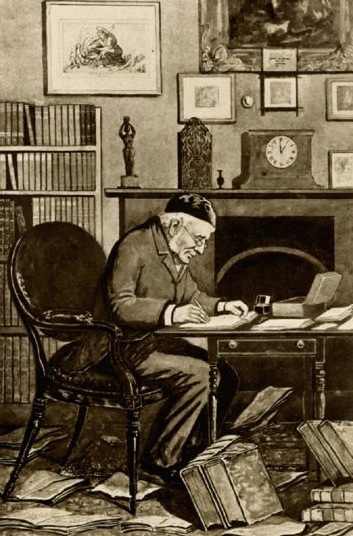Tags
Catholic Church, Catholicism, Christianity, controversy, Faith, Hell, Salvation, sin

St John Paul II’s ‘Crossing the threshold of hope’ informs much of this post.
The subject of hell has somewhat dominated our blog of late, and it might be time to outline what the Catholic Church has to say on the subject. As so often, it is necessary to draw a distinction between what the pious believe in a general way, and what the Church teaches officially. To give one example, many ordinary Catholics (and non-Catholics) would, if asked about hell, respond in terms of pitchforks, devils and real fire burning people, and if asked why they believe that would say ‘it is in the Bible’. But as our friend Bosco here so often shows, it is not enough to read everything in Scripture literally. The Church teaches from Scripture and Tradition, and does not neglect reason either. It knows that much of what will happen after death is a mystery, and, contrary to the charges of some of its critics, it does not try to make cut and dried what is mysterious. Those caveats entered, let me offer a synopsis of what I understand Catholic teaching in this area to be saying.
At death the soul is judged – this is known as the particular judgment. There are, the Church teaches, three outcomes to this judgment immediately after death: immediate unification with Christ; conditional unification, which is commonly called Purgatory; and immediate rejection which is eternal damnation – as the catechism puts it:
To die in mortal sin without repenting and accepting God’s merciful love means remaining separated from him for ever by our own free choice. This state of definitive self-exclusion from communion with God and the blessed is called “hell.”
The chief punishment of hell is separation from God. The careful reader of the link will see that the Church puts inverted commas around ‘eternal fire’, and this is because it is not pronouncing on the literal presence of fire. St Thomas Aquinas says it is a real fire, but with all respect to the Angelic doctor, that is his opinion, one we should take seriously, but not an article of faith. But it must be emphasised that in its official teaching the Church relies, as it always does, on the words of Jesus, who, according to St Matthew, said that at death people would be separated into two groups – everlasting punishment or eternal life. I can quite understand the Apologetics which then queries the existence of Purgatory on the ground this does not fit with the twofold division here (although, since the Church teaches that eternally there are only two destinations for us, there is no contradiction); what I find more puzzling is the notion that the idea of everlasting hell is not to be derived from this.
I quite understand the impatience of some thinkers with the assumption that, for example, when Paul speaks of people being unworthy of eternal life, that means they are going to hell, or that when he says the wages of sin are death that means sinners go to hell. If you do not believe in hell, or you do not believe in the Catholic teaching, you could not extrapolate it from such passages. However, we read Scripture as a whole, and once you take the sense of the Matthean passage just quoted, then it is natural to talk of hell in relation to the Pauline passages. I would entirely take Jessica’s point that Paul does not major on this theme, and would add to it that the Catholic Church follows suit – in a catechism of 2865 paragraphs only 5 of them deal with hell. As ever, the Church follows in the path of the first evangelists. This has the huge advantage that it can be secure in its teaching; it has the eternal disadvantage that there will be things it teaches which every age will find difficult. Our own age finds the idea of eternal torment one of those things. But let us examine the nature of that torment as far as we can.
Balthasar, whose Dare We Hope “That All Men Be Saved?” (1986) is more often criticised than read, did not teach universalism (indeed, it seems rather doubtful as to whether Origen did so either, but that’s another matter). He acknowledged that we all stand under judgment, and that, despite the distastefulness of the idea, eternal torment was not to be dismissed:
If we take our faith seriously and respect the words of Scripture, we must resign ourselves to admitting such an ultimate possibility, our feelings of revulsion notwithstanding. We may not simply ignore such a threat; we may not easily dismiss it, neither for ourselves nor for any of our brothers and sisters in Christ” (p. 237).
In this he was at one with St John Paul II, whose book, Crossing the Threshold of Hope (1994), also spoke of the hope that we might legitimately have that all men might yet be saved, but added (as Balthasar did) that sinful, prideful man might reject the love of God and choose not to be in his presence. To quote St John Paul directly:
“… yet the words of Christ are unequivocal. In Matthew’s Gospel he speaks clearly of those who will go to eternal punishment (cf. Matthew 25:46).”
Speaking in a General Audience on 28 July 1999, St John Paul said:
The images of hell that Sacred Scripture presents to us must be correctly interpreted. They show the complete frustration and emptiness of life without God. Rather than a place, hell indicates the state of those who freely and definitively separate themselves from God, the source of all life and joy.
God grants us free-will and we can reject him – in which case, as St John Paul II put it:
Damnation remains a real possibility, but it is not granted to us, without special divine revelation, to know which human beings are effectively involved in it. The thought of hell — and even less the improper use of biblical images — must not create anxiety or despair, but is a necessary and healthy reminder of freedom within the proclamation that the risen Jesus has conquered Satan, giving us the Spirit of God who makes us cry “Abba, Father!” (Rm 8:15; Gal 4:6).
The Church prays that all men may be saved (CCC 1821) and that no one will be lost (CCC 1058), and since Christ came to save all, again, and as usual, it does no more than its founder taught it. But Saint John Paul is right, it is not given to us to know who is in hell. Nor, in speaking of the latter, is it necessary to postulate literal flames. St Isaac the Syrian, in speaking of hell, expressed it best:
Those who are tormented in hell are tormented by the invasion of love. What is there more bitter and violent than the pains of love? Those who feel they have sinned against love bear in themselves a damnation much heavier than the most dreaded punishments. The suffering with which sinning against love afflicts the heart is more keenly felt than any other torment. It is absurd to assume that the sinners in hell are deprived of God’s love. Love is offered impartially. But by its very power it acts in two ways. It torments sinners, as happens here on earth when we are tormented by the presence of a friend to whom we have been unfaithful. And it gives joy to those who have been faithful. That is what the torment of hell is in my opinion: remorse.
This is very far away from pitchforks and devils and torture chambers. It is also, I would suggest, more accessible for us all. Which of us, having done something very wrong and come to repentance has not been tortured by the remembrance of our sin? As the old Anglican General Confession put it: ‘The remembrance of them is grievous unto us; The burden of them is intolerable.’ These are the things which drive us to confess and to repentance. They are healthy for us because they encourage us to turn aside from our sins.
None of this is to say that ‘fear’ in its common sense, is what drives us to God. If we love Him, we will feel remorse, and the remembrance of our sins is intolerable. If we do not, then hell is most likely the state of coming to that realisation too late. That is our choice. There is no eternal torture chamber created by God – just the one we construct for ourselves.
I hope that this helps set forth what the Church teaches in a form which is of assistance. The traditional caricatures are not, in my own view, very helpful, and, as we have seen here recently, can create confusion and anxiety. That is not what the Church wishes to do – it wishes as its founder wished, that all men might turn from their sins in repentance and come to Christ. Might we hope for that? Of course we can, the Church does; can we say it is so? No, for the Church has not said so. St Isaac said this life is for repentance, and, as the thief at the right hand of the Saviour found, whilst there is life there is hope – and whilst there is hope, then there is prayer we can all offer that all who have not yet repented and turned to Christ, might yet do so.




 We have been discussing
We have been discussing 



You must be logged in to post a comment.